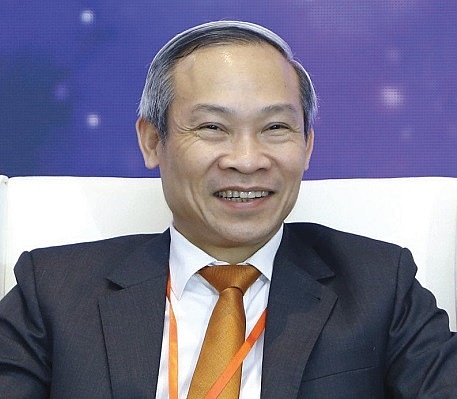INTERNATIONAL INVESTMENT
AND PORTAL
Experts have highlighted a promising recovery in Vietnam’s stock market and general economy, despite ongoing geopolitical and inflationary risks.

At the Vietnam Wealth Advisors Summit 2024 co-hosted by VIR and Vietnam Wealth Advisors community last week, Dr. Can Van Luc, chief economist of BIDV Training School, noted the positive recovery in the stock market.
Nevertheless, he identified four major risks and challenges leading into next year: complex geopolitical conflicts, increased strategic competition among major powers, persistent high inflation and interest rates, and elevated public and private debt risks.
“The global economic slowdown will impact Vietnam’s economy, particularly the recovery of exports and consumption. If the US reduces interest rates soon, it could lead to lower consumer demand, directly affecting export orders from Vietnamese businesses,” he said.
However, Luc also noted that growth drivers are recovering, albeit unevenly.
“Macroeconomic foundations and risk management have improved, fiscal risks such as public debt, foreign debt, and government debt obligations remain at moderate levels, and there is still room for fiscal policy, which helps ease monetary policy pressure,” he said.
Additionally, inflation is under control, interest rates are decreasing, exchange rates and non-performing loans are manageable, and the stock market is performing well due to expectations of market upgrades and a recovering real estate sector.
Vietnam’s economy is rebounding, with retail sales revenue increasing by 8.7 per cent in the first five months of the year. The tourism sector, especially international tourism, has shown strong recovery, with a 3.9 per cent increase compared to the same period in 2019.
However, while consumer demand is recovering, spending remains low, Dr. Luc highlighted. The first four months of 2024 saw accommodation, catering, and travel service revenues reach a 14.5 per cent increase on-year.
Dr. Luc identified several challenges facing businesses, including legal issues, financial obligations, high input costs, and uneven order recovery leading to unsustainable growth and low profit margins.
“Private investment remains cautious, consumer growth is low, the corporate bond market is recovering slowly, and institutional frameworks for new sectors like the digital economy, green economy, and circular economy are slow to develop,” he noted. “Additionally, fear of making mistakes, fear of responsibility, and slow public service execution still persist.”
Meanwhile, one financial expert told VIR last week that amendments to the Real Estate Business Law and the Housing Law fundamentally revise social housing policies, expanding the scope of beneficiaries, simplifying implementation procedures, and introducing new regulations for social housing developers.
“Given the significant market capitalisation of the real estate sector, accounting for approximately 14 per cent of the VN-Index, positive trading in this sector due to these supportive factors could bolster the overall market in the coming month. The historical price-to-book valuation of sectors in the VN Index from 2018 to present shows that the real estate sector remains relatively attractive compared to other sectors,” he said.
At last week’s summit, Nguyen Minh Tuan, CEO of AFA Capital, forecasted that among the four financial asset classes, the investment channel for deposits has bottomed out, suggesting that yields on deposits will be higher moving forward.
He recommended that investors increase their proportion of deposits, not only to earn interest, but also to be prepared for market opportunities by using the funds to strengthen other asset classes. “Interest rates in the residential market have started to rise again following measures by the State Bank of Vietnam (SBV) to stabilise the exchange rate. I believe there will be many opportunities from now until the end of the year, and we need to be prepared with sufficient funds to increase other asset classes,” Tuan stated.
Regarding bonds, he highlighted that for investors, particularly individual investors, investing through public bond issues and open-end bond funds continues to yield good returns. In light of significant volatility in the gold and stock markets, he suggests increasing fixed-income assets from now until the second half of the year.
While access to privately issued bonds is restricted to professional securities investors verified by brokerage firms, investors can easily invest through open-end bond funds.
“For individual investors with limited time and market experience, investing through open-end funds provides the added benefit of experienced investors reviewing and assessing the bond holdings,” Tuan added.
He acknowledged the ongoing risks in the bond market, particularly regarding maturity pressure. However, he advised investors to consider bonds issued by banks, which have issued large volumes since the end of 2023 through public offerings accessible to all investors.
In its base scenario, KB Securities Vietnam (KBSV) anticipates that the VN-Index will require more time to move sideways around its peak in June, with stock groups showing varied performances before making more significant moves as the Q2 business outlook becomes clearer.
“Factors that could influence market sentiment in June include corporate earnings reports for June and Q2,” KBSV noted. “Changes in net buying/selling values by foreign investors will also be noteworthy, as a slowdown in foreign selling is positive for the market.” Additionally, the market needs to monitor the USD/VND exchange rate and actions by the SBV.
However, investors should be aware of three risks that could impact the base scenario. “Firstly, geopolitical conflict risks are escalating. Tensions in the Middle East and the potential for these to spread globally pose a threat to global stability, affecting commodity prices and supply chains,” KBSV stated.
“Secondly, if foreign investors continue their net selling trend, it could hinder the overall index recovery. Thirdly, the strengthening of the USD continues to pressure exchange rates and influence SBV policies.”
Tran Quoc Phuong, deputy Minister of Planning and Investment
This year continues to be one of many unpredictable movements around the world. These uncertainties not only threaten regional and international security, and maritime safety, but also affect the supply chain of goods, food security, and global energy security. This has led to a slower and uneven recovery of the global economy, with financial and currency markets, and global investment flows being strongly affected.

However, Vietnam’s economy continues its recovery trend, achieving many important and encouraging results. There are many favourable factors, both external and internal, so we can expect a positive recovery trend of the economy.
Despite positive recovery, Vietnam’s economy is still struggling with some difficulties, due to unpredictable developments in the world and regional situation as well as internal problems of the economy.
The Ministry of Planning and Investment will continue to research, advise, and propose that the government improves institutions and develops policies to promote growth, maintain macroeconomic stability, and control inflation, ensuring major balances.
To reach the 2024 plan, the economy should continue to strongly promote and renew traditional drivers of investment, consumption, and export; supplement and take advantage of opportunities from new growth drivers and new economic models, such as digital transformation, green transition, circular economy, and the sharing economy, or new industries like chip production, semiconductors, and renewable energy.
Promoting disbursement of public investment and implementing strategic infrastructure projects is also an important solution.
Do Thanh Tung, deputy director of Analysis Rong Viet Securities Corporation

Since the start of 2024, the government has pronounced its top priority of propelling economic growth through the introduction of expanded monetary and fiscal policies.
Along with this, the State Bank of Vietnam (SBV) has granted a credit limit to the banking sector at 15 per cent, which is an unprecedented move in an attempt to bolster economic growth.
The interest rates had taken a dip in the first quarter, which serves as a perfect catalyst to entice capital flow to the stock market, helping to re-evaluate the market in the context listed companies eye profit rebound. We see that market valuations in general are moving towards its 10-year average, based on the catalysts of low interest rates as well as recovering earnings growth.
Another variable that could impact the market outlook for the rest of this year and into 2025 is closely related to the market upgrade story. Preparations for the upgrade have been well underway, despite recent delays in the rollout of the new trading system.
With these dynamics, we are confident that the market will maintain its uptrend until the end of the year, but the path is not completely smooth as there will be adjustment periods and there exist diverse variables that we need to monitor, such as the interest rates.
Phan Duc Hieu, standing member National Assembly Economic Committee

The government is taking a completely different approach to providing information and regulating socioeconomic development. In 2023, priority was given to macroeconomic control, combining proper fiscal policy and monetary policy. In 2024, top priority is given to promoting economic growth.
Regarding institutions, the government in Vietnam is implementing policies very drastically, controlling the quality of documents from the promulgation stage as well as strengthening coordination among state agencies. Over the past year, some important laws have been issued, including on housing, real estate, land, and credit institutions.
Businesses should carefully research and formulate suitable strategies in line with these four important laws, which can restructure the market for relevant production and business industries.
My advice for businesses is to closely follow the regulatory changes. Thus, they can provide feedback, make adjustments, and formulate scenarios from the drafting stage until the enforcement stage.
Truong Van Phuoc, former chairman National Financial Supervisory Commission

There are some uncertain variables in the global economy in the coming time. While international media predicts that the US Federal Reserve will cut its key interest rate in September. I think it is likely to do so in July. Another variable is the 2024 US elections in November.
To adapt flexibly to uncertainties, Vietnam needs more drastic changes in its policy. For instance, the country’s gold prices were VND20 million ($785) higher than the global gold prices. With the government’s intervention, Vietnam has narrowed the gap to around VND4 million ($160). It is clear that Vietnam posts good macroeconomic indicators, but we don’t have space to adapt to turbulence.
Take relief measures, for example. Vietnam has issued different relief measures to support the recovery of its businesses and citizens. However, compared with developed countries, it takes longer for Vietnamese businesses and citizens to receive subsidies. If we can close regulatory loopholes, Vietnam should post higher economic growth, while the market should see further enhancements.
Nguyen Sang Loc, director of Operations Dragon Capital Vietfund Management

All central banks globally are at the end of their interest rate hike cycles because, after a prolonged battle with inflation, the next priority is maintaining employment levels. Major global economies have shown signs of slowing, as evidenced by the Bank of Canada cutting rates by 25 basis points on June 5, and the European Central Bank is expected to follow suit.
In Vietnam, we use interest rate tools to support the exchange rate issues, indicating that Vietnam will return to that cycle in the future.
Beyond macroeconomics, the most critical issue remains corporate profits. Since Q3 last year, Dragon Capital has been monitoring less common indicators such as electricity consumption to observe recovery in production, tracking the flow of goods through Vietnamese ports, and examining retail sales and spending data to see growth in both value and volume. This indicates that the recovery began gradually from late Q3 last year, although the broader context remained challenging. Experts will agree that Vietnam’s economy is in the early stages of recovery.
Nguyen Ba Huy, chief investment officer SSI Asset Management

The government has implemented rational measures to address interest rate differentials, ensuring that exchange rate issues impacting investor decisions will become insignificant in the near future. Policy-wise, we have increasingly focused on growth, with banks utilising their credit quotas early in the year.
Interest rates are not expected to rise significantly or tighten. Any increase will be minimal. A low interest rate environment will continue to drive economic growth, potentially leading to the return of domestic capital flows.
Interest rates will play a crucial role, directly impacting the stock market, capital markets, and business decisions. Should geopolitical factors arise, inflation is not anticipated to be a significant concern in Vietnam.
In the near future, numerous industries will have the basis to grow and expand their operations. Key factors for the stock market in the coming period will include a low production environment, stable macroeconomic conditions, and recovering business growth.
 VWAS 2024: Adapting to Uncertainties
VWAS 2024: Adapting to Uncertainties VWAS (Vietnam Wealth Advisor Summit) 2024 "Adapting to Uncertainties" took place on the afternoon of June 6 in the Pullman Hanoi with the participation of 300 representatives, and thousands of online attendees, including state management agencies, experts, credit institutions and securities companies, investment funds, listed enterprises, real estate developers among others.
 VWAS 2024 panel discussion identifies global economic uncertainties
VWAS 2024 panel discussion identifies global economic uncertainties Experts identified uncertainties facing the global economy and their impacts on the Vietnamese economy during the first panel discussion at the Vietnam Wealth Advisor Summit (VWAS) 2024 on June 6.
 Stock market holds investment potential from now until year end
Stock market holds investment potential from now until year end The stock market holds potential for investment this year in the context of the macroeconomic recovery and a rebound in manufacturing and business activities across most sectors.
By Celine Luu



















